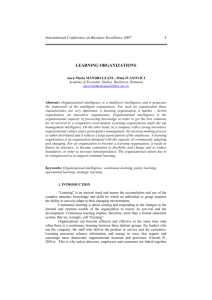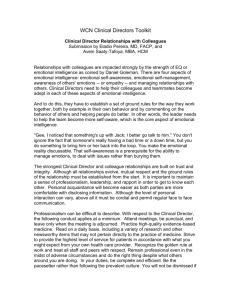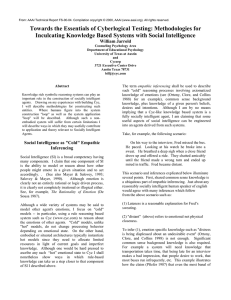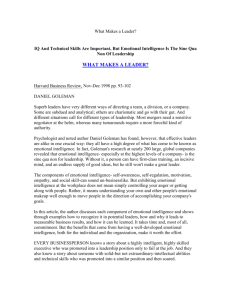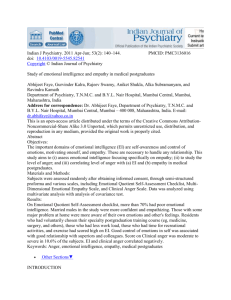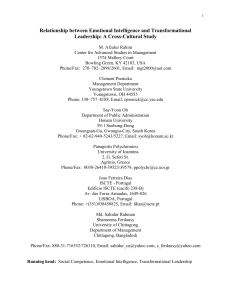EI-Social-Skill-FFD
advertisement
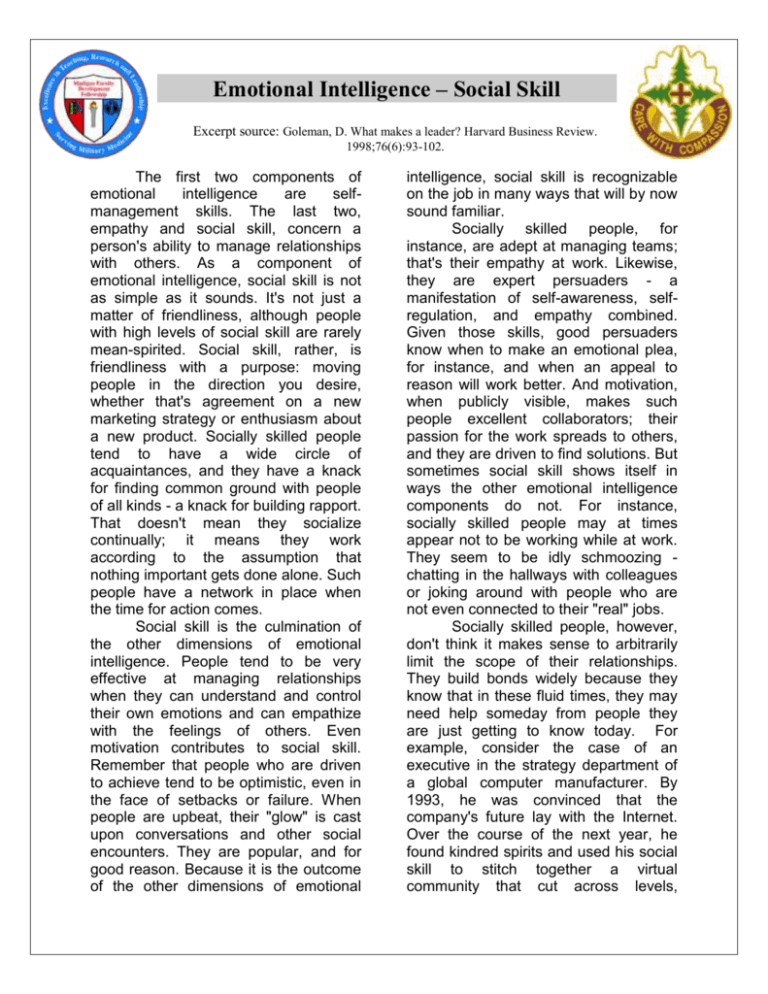
Emotional Intelligence – Social Skill Excerpt source: Goleman, D. What makes a leader? Harvard Business Review. 1998;76(6):93-102. The first two components of emotional intelligence are selfmanagement skills. The last two, empathy and social skill, concern a person's ability to manage relationships with others. As a component of emotional intelligence, social skill is not as simple as it sounds. It's not just a matter of friendliness, although people with high levels of social skill are rarely mean-spirited. Social skill, rather, is friendliness with a purpose: moving people in the direction you desire, whether that's agreement on a new marketing strategy or enthusiasm about a new product. Socially skilled people tend to have a wide circle of acquaintances, and they have a knack for finding common ground with people of all kinds - a knack for building rapport. That doesn't mean they socialize continually; it means they work according to the assumption that nothing important gets done alone. Such people have a network in place when the time for action comes. Social skill is the culmination of the other dimensions of emotional intelligence. People tend to be very effective at managing relationships when they can understand and control their own emotions and can empathize with the feelings of others. Even motivation contributes to social skill. Remember that people who are driven to achieve tend to be optimistic, even in the face of setbacks or failure. When people are upbeat, their "glow" is cast upon conversations and other social encounters. They are popular, and for good reason. Because it is the outcome of the other dimensions of emotional intelligence, social skill is recognizable on the job in many ways that will by now sound familiar. Socially skilled people, for instance, are adept at managing teams; that's their empathy at work. Likewise, they are expert persuaders - a manifestation of self-awareness, selfregulation, and empathy combined. Given those skills, good persuaders know when to make an emotional plea, for instance, and when an appeal to reason will work better. And motivation, when publicly visible, makes such people excellent collaborators; their passion for the work spreads to others, and they are driven to find solutions. But sometimes social skill shows itself in ways the other emotional intelligence components do not. For instance, socially skilled people may at times appear not to be working while at work. They seem to be idly schmoozing chatting in the hallways with colleagues or joking around with people who are not even connected to their "real" jobs. Socially skilled people, however, don't think it makes sense to arbitrarily limit the scope of their relationships. They build bonds widely because they know that in these fluid times, they may need help someday from people they are just getting to know today. For example, consider the case of an executive in the strategy department of a global computer manufacturer. By 1993, he was convinced that the company's future lay with the Internet. Over the course of the next year, he found kindred spirits and used his social skill to stitch together a virtual community that cut across levels, divisions, and nations. He then used this de facto team to put up a corporate Web site, among the first by a major company. And, on his own initiative, with no budget or formal status, he signed up the company to participate in an annual Internet industry convention. Calling on his allies and persuading various divisions to donate funds, he recruited more than 50 people from a dozen different units to represent the company at the convention. Management took notice: Within a year of the conference, the executive's team formed the basis for the company's first Internet division, and he was formally put in charge of it. To get there, the executive had ignored conventional boundaries, forging and maintaining connections with people in every corner of the organization. Is social skill considered a key leadership capability in most companies? The answer is yes, especially when compared with the other components of emotional intelligence. People seem to know intuitively that leaders need to manage relationships effectively; no leader is an island. After all, the leader's task is to get work done through other people, and social skill makes that possible. A leader who cannot express her empathy may as well not have it at all. And a leader's motivation will be useless if he cannot communicate his passion to the organization. Social skill allows leaders to put their emotional intelligence to work.






